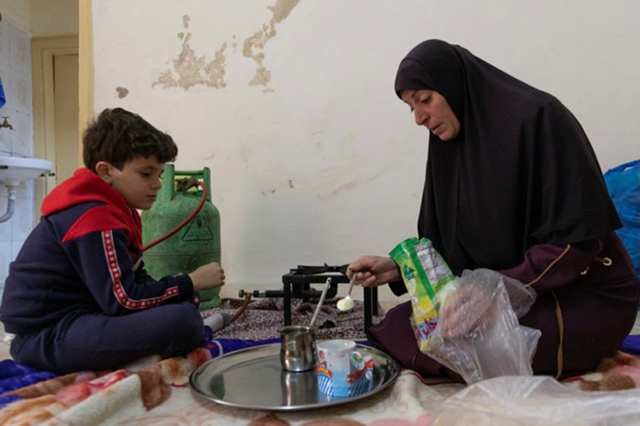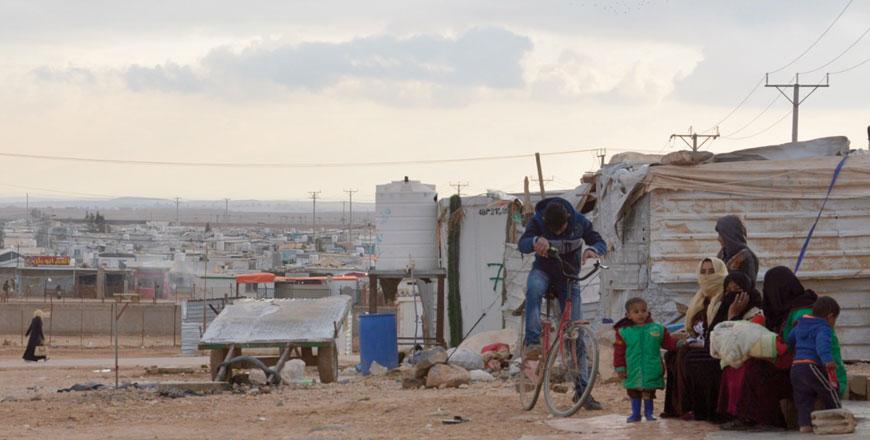You are here
Funding shortfalls: UNHCR’s winterisation response reached less than 2.6 million vulnerable refugees in MENA
By Mays Ibrahim Mustafa - May 25,2023 - Last updated at May 25,2023

The 2022-2023 winter assistance reached 1,805,298 Syrians and 49,113 Iraqis and refugees of other nationalities, 1.86 million of whom were supported with cash assistance, and 704,507 received core relief items, according to the most recent UNHCR report (Photo courtesy of UNHCR)
AMMAN — Due to funding shortfalls, the United Nations High Commissioner for Refugees’ (UNHCR) winterisation response for 2022-2023 reached less than 2.6 million vulnerable refugees in the Middle East and North Africa (MENA) region, as of March 31.
The most recent UNHCR report detailing the distribution of the assistance in Iraq, Jordan, Lebanon and Syria noted that this number accounts for only 77 per cent of the initial target, which is “a sizable reduction” compared to UNHCR’s 2021-2022 winterisation response that reached 88 per cent of its target, equal to 3.1 million individuals.
“As the winter season set across the Middle East and North Africa region, UNHCR continued to assist refugees, asylum-seekers and internally displaced persons (IDPs) to cope with their winter needs. Despite re-prioritising resources and generous contributions from donors, only 41 per cent of the $250 million required was funded for this winter period”.
“As a result, UNHCR was unable to deliver winter assistance in Egypt at all, while other country operations revised the transfer values of cash assistance to be in a position to reach as many vulnerable refugee and IDP families as possible to minimise the impact of winter on their households,” the report stated.
It showed that the 2022-2023 winter assistance reached 1,805,298 Syrians and 49,113 Iraqis and refugees of other nationalities, 1.86 million of whom were supported with cash assistance, and 704,507 received core relief items (CRIs).
In Jordan, cash and in-kind assistance for winter was delivered to 434,723 Syrian refugees, which is higher than the initial target of 391,400. Of the 11,454 targeted Iraqis, 9,671were provided with cash assistance, according to the report.
It explained that “the operation opted to increase the number of individuals receiving the reduced assistance, and once later, additional funding arrived, a further set of beneficiaries were also assisted with the same package. This resulted in a higher than originally planned total number of beneficiaries”.
The report also pointed out that in order to support all targeted individuals amid limited funding, UNHCR reduced its winter assistance amounts.
It stated that regular cash assistance for basic needs provided to refugees in both urban and camp settings totalled JD70 per family, compared to JD185 in urban areas and JD300 in camps during the 2021-2022 winter season. Additionally, those who are not provided with regular assistance received JD95 per family compared to JD230 in the previous winter.
“Winter assistance had a generally positive impact on refugees, with 36 per cent of those surveyed reporting a moderate or significant improvement in living conditions, with a further 53 per cent reporting a slight improvement. The needs however remained high, since even with the limited additional assistance provided by UNHCR for winter needs, only 25 per cent reported being able to meet half or more of their basic needs,” the report added.
Related Articles
AMMAN — UNHCR, the UN Refugee Agency, has received no funding for the 2022 winter assistance programme.
AMMAN — UNHCR, the UN Refugee Agency, reported distributing $14.18 million in winter cash assistance for roughly 113,000 refugee households
AMMAN — The UN Refugee Agency (UNHCR) on Monday appealed for $270 million in urgent funding, seeking to address the needs of internally disp
















